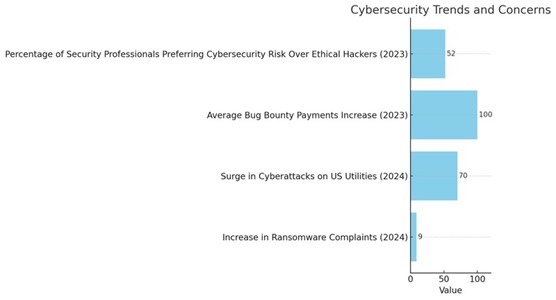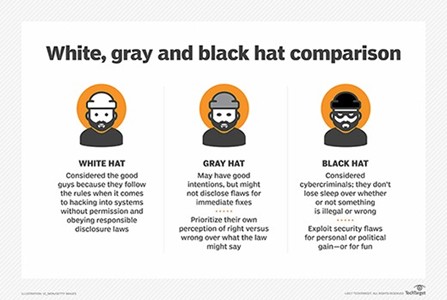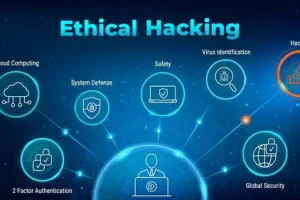
Why Companies Need Ethical Hackers More Than Ever?
- Posted by 3.0 University
- Categories Ethical Hacking
- Date May 6, 2025
- Comments 0 comment
The Role of White Hat Hackers in Cybersecurity
Firstly, we need to learn ‘What Is a White Hat Hacker (Ethical Hacker)’, to be able to dive into to whole landscape of ethical hacking in cybersecurity.
Cyber threats have escalated dramatically, and new, clever tactics appear every day—so guarding digital assets has become a real headache for many organizations.
White hat hackers, sometimes called ethical hackers, jump in to spot and fix security gaps before any nefarious actors can take advantage.
They work strictly within legal bounds with clear organizational permission, which sets them apart from black hats whose aim is simply to cause harm.
These experts do more than just run standard checks; they perform penetration tests, run vulnerability scans, and even pull off social engineering tricks to reveal weak spots.
Generally speaking, such a hands-on approach is key as remote work broadens potential attack zones while regulatory demands steadily rise.
Upon teaming up with these trusted pros, companies shore up their defences and elude risks that can be potential damage to customer trust, or they can even destabilize finances.
Eventually, the mix of practical expertise and genuine ethical dedication provided by white hat hackers remains to be a crucial component in today’s cybersecurity landscape.
The Increasing Need for White Hat Hackers in Modern Businesses
Today, the digital world is shifting fast, and companies are up against challenges when it comes to protecting their data and networks from crafty cyber mischief.
With more folks relying on cloud services and working from home, the ways attackers can sneak in have grown—a situation that makes the old measures seem, generally speaking, a bit outmoded.
In most cases, firms are now pushed to think ahead and mix in fresh defense tactics; for example, bringing in ethical hackers who dig into a system’s weak spots before any real trouble brews.
These white hat types, as some call them, use their know-how to spot and fix vulnerabilities—often in a way that’s almost intuitive—another line of defense against ever-more frequent cyber onslaughts like ransomware and phishing scams.
One expert even remarked, “This trend clearly shows that the white hat community is an important force to improve cybersecurity.”
By constantly probing and patching up defenses (and, yes, sometimes even rechecking their work), these ethical hackers help companies meet strict regulations and nurture the kind of consumer trust that matters.
Their role, despite the occasional hiccup in the process, proves indispensable in a modern enterprise struggling to balance innovation with protection.

The chart demonstrates key cybersecurity trends and concerns over recent years. It also displays the histrionic rise in complaints pertaining to ransomware, a weighty surge in cyberattacks targeting US utilities, a notable spike in average bug bounty payments, and highlights the percentage of security professionals who prefer cybersecurity risks over engaging ethical hackers.
Besides, it also underscores the escalating cyber threats businesses face and the dire necessity for collaboration between organizations and ethical hackers.
Advantages of Employing White Hat Hackers for Organizational Security
There are, seemingly, myriad benefits of White Hat Hacking.
Cyber threats are increasing, and attacks are becoming increasingly sophisticated, necessitating companies to think beyond the conventional security checklist.
Many organizations are opting to work with ethical—or white hat—hackers who can, quite frankly, help spot and fix vulnerabilities before bad actors have a chance.
These specialists carry out tasks such as penetration testing, running vulnerability checks, and even staging simulated cyberattacks under controlled conditions, which generally gives systems a tougher, more comprehensive shield.
This method often cuts down the risk of expensive breaches and, in most cases, helps firms meet strict rules like those set by GDPR and HIPAA.
Plus, white hat hackers can really help boost cybersecurity awareness among team members, strengthening overall resilience.
Unlike black or grey hat hackers, these professionals stick to legal and ethical lines, offering clear, reliable insights into potential security issues—as depicted in the clear distinctions outlined in the image.
In the end, bringing ethical hackers on board not only reinforces defenses but also preserves a company’s reputation and safeguards essential digital assets in an ever-shifting threat landscape.
Effective Techniques Utilized by White Hat Hackers
White Hat Security Techniques are handy. In today’s complex cyber landscape, companies must swiftly take action, frequently implementing measures to prevent vulnerabilities before a cunning attacker can exploit them.
White hat hackers, those ethical defenders, mix a number of clever techniques; for instance, penetration testing mimics real attacks so you can spot hidden flaws in apps, networks, or even physical setups.
In many cases, they back their claims up with vulnerability assessments that methodically scan both software and hardware, helping firms decide what to fix first.
Occasionally, they even test how well people hold up by staging social engineering scenarios, like phishing drills, which really brings home the fact that humans are a big part of cybersecurity.
Other approaches—say, checking wireless networks or running red team drills—add extra layers to keep defences robust across various attack angles.
White Hat Security tools such as Metasploit and Burp Suite, which sharpen the overall precision and depth of these evaluations, also play a key role in this mix.
By deploying these techniques in a thoughtful way, organizations strengthen their defences and meet compliance standards, making ethical hackers pretty indispensable.
All in all, this mix of hands-on expertise explains why white hats remain crucial in safeguarding modern enterprises.

Image1. Comparative overview of white hat, gray hat, and black hat hackers in cybersecurity ethics.
Conclusion
Today, cyber threats keep ramping up—not just in number but also in cleverness—which pushes companies to ditch the old habit of simply reacting after something goes wrong and instead plan ahead.
White hat hackers, armed with both specialized skills and a strong sense of right and wrong, end up acting like early inspectors who sniff out weak spots before the bad guys even get a chance.
They mix things up by running penetration tests, checking for vulnerabilities, and even trying out social engineering—each step helping to protect sensitive info and a company’s good name from potential disasters.
Not only do these ethical hackers possess technical expertise, but they also assist businesses in adhering to regulations and cultivating a workplace culture that prioritizes cybersecurity, typically.
The bond between companies and these digital guardians often turns out to be a smart investment—it cuts down on possible financial hits and legal messes while also keeping customer trust steady in an online world that can feel a bit too hostile at times.
All in all, teaming up like this opens secure doorways for data and operations, showing just how essential ethical hackers are in keeping our cyber defenses strong today.
You may also like

How to Learn Ethical Hacking without Experience in 2025?


